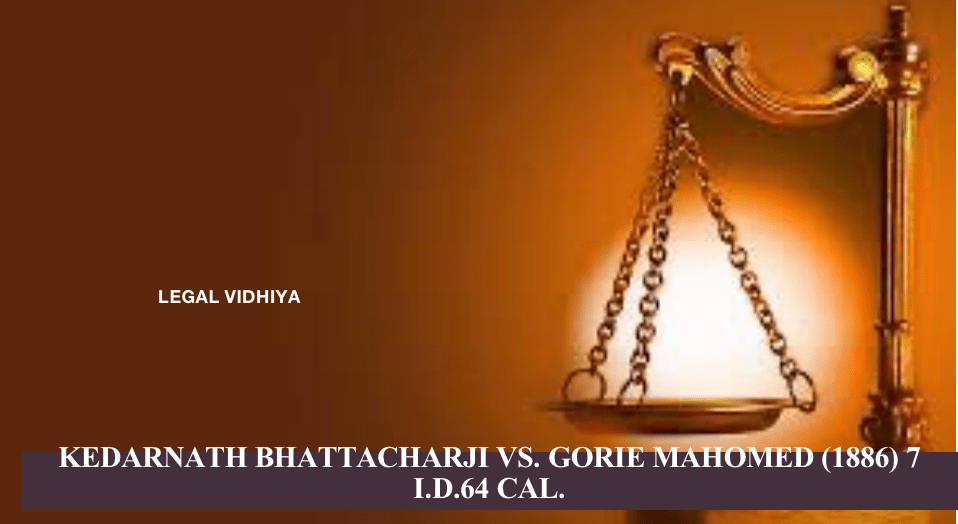KEDARNATH BHATTACHARJI VS. GORIE MAHOMED (1886) 7 I.D.64 CAL.

| Citation | ILR 14 Cal 64 |
| Date of Judgment | 26th November,1886. |
| Court | Calcutta High Court. |
| Case Type | Indian Contract Act,1872. |
| Appellant | Kedarnath Bhattacharji. |
| Respondent | Gorie Mahomed. |
| Bench | Sir W Comer Petheram, Knight, Chief Justice, and Mr. Justice Beverley |
| Referred | “Any act done at the will of the promisor’s wish is taken as the fulfillment of consideration of a contract“ |
FACTS OF THE CASE
In the case discussed, Kedarnath Bhattacharji, a Municipal Commissioner and trustee of the Howrah Town Hall Fund, had been involved in efforts to construct a town hall in Howrah. After raising sufficient funds, the commissioners entered into a contract with a contractor for the construction. However, as the subscription list grew and the plans expanded, the cost increased beyond the agreed amount. Despite the variation in the contract terms, the commissioners were held liable for the increased cost as they had authorized and approved the changes.
The defendants, Gorie Mahomed, had made a subscription towards the construction but later refused to pay. The commissioners sued Gorie Mahomed to recover the amount subscribed. Initially, the lawsuit was filed in the Howrah Court of Small Causes, with the power to sue granted by the Registrar of the Court under Section 30 of the Code of Civil Procedure of 1908. However, the defendant argued that the plaintiff lacked the right to sue, and the Small Cause Court judge agreed, stating that the Registrar did not possess the authority to grant leave to sue. The court also classified the Town Hall as trust property and deemed the plaintiff’s suit invalid from the beginning.
Additionally, it was brought to the court’s attention that the defendant had limited education, suggesting that he may not have been fully aware of the implications of subscribing. It was argued that the defendant had no legal obligation to pay the amount for which he was initially sued. As a result, the Small Cause Court dismissed the suit, prompting the plaintiff to bring the case before the Calcutta High
ISSUES
In the High Court of Calcutta, the following issues were raised:
- Whether or not the suit the plaintiff brought is legally maintainable?
- Whether or not the defendant could be held liable and made to pay the amount for the subscription which he failed to pay
ARGUMENTS
Plaintiff’s Argument: Kedarnath Bhattacharji, the plaintiff, argued that the defendant, Gorie Mahomed, had subscribed to pay one hundred rupees towards the construction of the Town Hall. As a subscriber, Mahomed had a contractual obligation to fulfill his financial commitment.
Defendant’s Argument: Gorie Mahomed contended that he was not under any legal obligation to pay the amount because he lacked the necessary knowledge and understanding of the subscription he had made. He argued that due to his limited education, he could not be expected to be fully aware of the implications of his subscription.
JUDGEMENT
The case was initially heard in the Howrah Court of Small Causes, where the judge ruled in favor of the defendant. The court held that the Registrar, who granted the power to sue to the plaintiff under Section 30 of the Code of Civil Procedure of 1908, did not possess the authority to grant such leave. The court further classified the Town Hall as trust property, implying that it fell within the ambit of a trust. Consequently, the court deemed the plaintiff’s lawsuit as invalid from the beginning (bad ab initio).
The defendant’s argument regarding limited education and lack of awareness of the implications of his subscription played a significant role in the court’s decision. The Small Cause Court dismissed the suit, suggesting that Gorie Mahomed was not legally obligated to pay the subscribed amount. .Following the dismissal, the plaintiff appealed the decision to the Calcutta High Court for further review and judgment.
In a typical scenario, when a person subscribes to a charitable cause, their subscription cannot be considered as consideration. As a result, the subscribed amount is not usually recoverable. However, in the present case, it was observed that the subscribers were fully aware of the purpose for which their money would be utilized. They were also cognizant that the plaintiff and other commissioners had entered into a contract based on their subscriptions. Considering these circumstances, the Calcutta High Court deemed the formed contract to be valid, with a good consideration.
The court held that the defendant, Gorie Mahomed, is liable to honor the promise he made in the contract, even if it is not entirely to his benefit. The defendant cannot retract or refuse to fulfill his commitment after the commencement of the contract. The court emphasized that the defendant, as a subscriber, has a responsibility towards the promise he originally made, and he cannot evade it. Furthermore, the Calcutta High Court determined that the plaintiff’s suit is legally maintainable, indicating that the plaintiff had the right to file the lawsuit to recover the amount owed to them by the defendant.
REFERENCES
https://indiankanoon.org/doc/1428496/
https://llbmania.com/2022/04/28/kedarnath-bhattacharji-v-gorie-mohammad-1887-ilr-14-cal-64/
This Article is written by Bhumika H Brahmbhatt of JG Institute of Law, Intern at Legal Vidhiya.




0 Comments